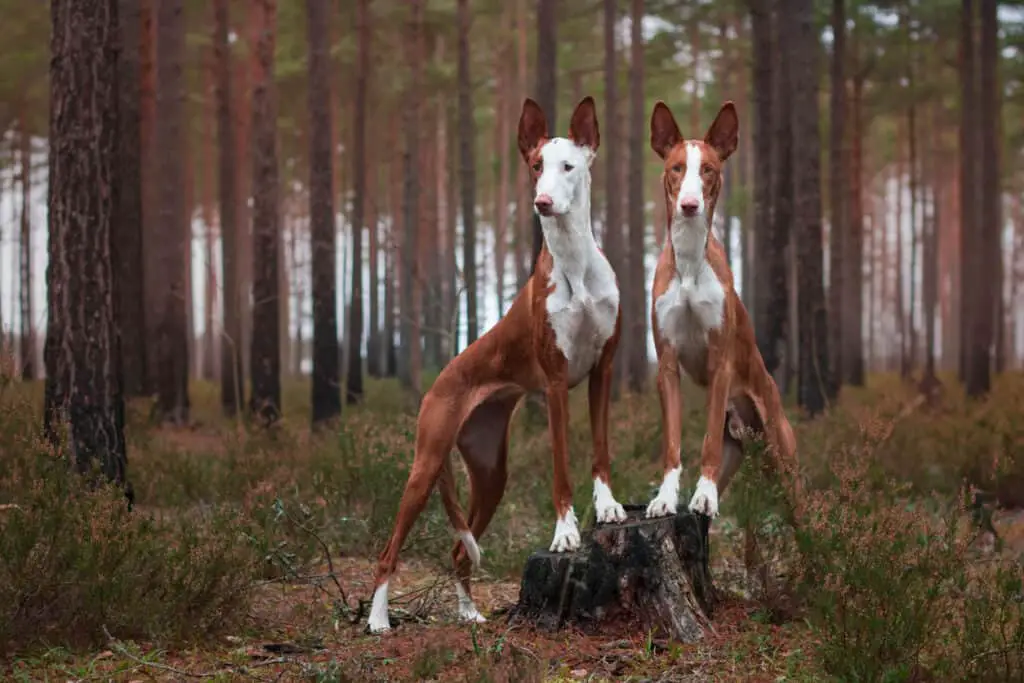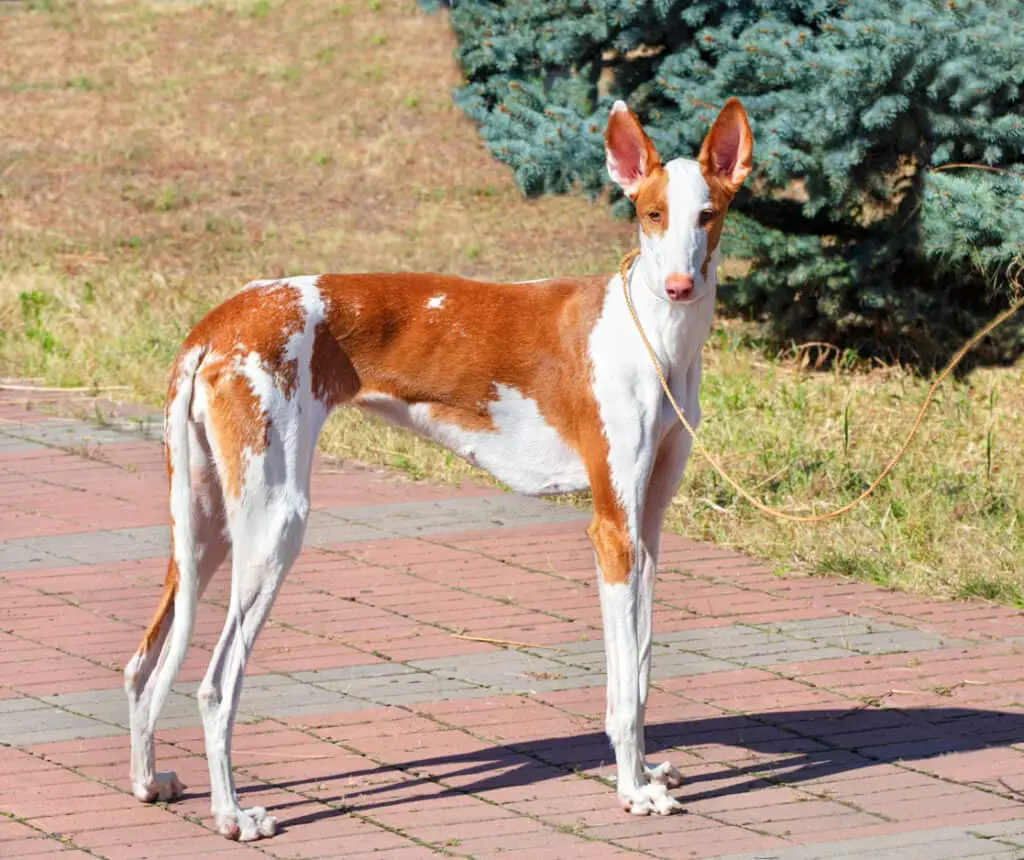Complete Guide To The Ibizan Hound: Personality, Feeding, Where To Find and More
The Ibizan Hound was part of the ancient Egyptian landscape. One of many dogs as revered as the Pharaohs, they were brought to their namesake island over 5000 years ago where their hunting prowess made them genuine heroes.

Table of Contents
How Big Do Ibizan Hounds Get?
| Height | Weight | |
| Male | 23.5″ – 27.5″ at the shoulder | 50 lbs |
| Female | 22.5″ – 26″ at the shoulder | 45 lbs |
What Do Ibizan Hounds Look Like?
Ibizan Hounds, or Beezers, stand tall for their 45-50 pounds. Long-legged and lean, they’re delicate and deer-like. Tall ears frame a chiseled Roman muzzle and soft caramel eyes — their thin tapered tails are curved and always in motion.
The Ibizan’s coat comes in two varieties — a short type so smooth that it feels like skin and a wire-haired version as long as three inches. Colors are red and white, solid or mixed — any other hue is a disqualification.
The Ibizan Hound shares characteristics with most sighthounds, including the Greyhound. A close cousin is the Pharaoh Hound, a similar breed from the days of the pyramids.
What Is The Personality Of An Ibizan Hound?
Ibizan Hounds are gentle souls. Adaptable, they’ll enjoy both city and country life as long as they get enough exercise — they rarely bark unless provoked and make welcomed neighbors. Energetic, they also enjoy the good life and plenty of downtime.
Affectionate with family but wary of strangers, Ibizans are playful and protective companions for kids. But they have limited patience for noisy toddlers, so homes with older children are best. Early socialization and obedience training helps them be more confident in social situations.
How Much Exercise Do Ibizan Hounds Need?
Born to run, Beezers won’t wear you out, but they need more than walks around the block — devote an hour a day to exercise. As swift as Greyhounds and equally tenacious, they have a need for speed and are rarely satisfied without an outlet for their racing ability.
Ibizan’s enjoy the usual backyard games, but a secure play area is a must. They’ve been known to top 6-foot fences in a single bound. Prey-driven, walk them only on a leash.
Athletic, Beezers excel at canine sports, including lure coursing. If you run, you have a partner for life. Amicable toward other dogs, the dog park is a favorite stop for impromptu playdates.

How Much Grooming Do Ibizan Hounds Need?
The Ibizan’s easy-care coat is a cinch to groom regardless of type. They shed little, but you’ll notice more hair in the house with wire-haired dogs.
Brush them weekly with a medium-bristled brush or grooming mitt to remove debris and distribute skin oils — the more you brush, the sleeker and shinier they’ll be. Fastidious dogs, Ibizans aren’t known for doggy odor, so unless they get messy, an occasional bath will do.
Ibizans need conscientious ear care. Clean them monthly with an alcohol-free, pH-balanced solution to remove excess wax and help prevent infections. Thin, their tall pinnae are vulnerable to sunburn, so ask your veterinarian about dog-safe sunscreen and shade their play area when possible.
Daily runs help keep the Ibizan’s nails naturally short, but their feet are sensitive — occasional trimming prevents overgrowth and smooths rough edges. Filing their nails while you’re cuddling in front of the TV is a gentler approach for dogs wary of clippers.
What Kind Of Dog Food Is Best For Ibizan Hounds?
Ibizan Hounds don’t have any specific nutritional requirements. Make sure you feed them based on their lean body mass.
Best Adult Food For Ibizan Hounds:
- Purina Pro Plan Large Breed
- Eukanuba Adult Dry Dog Food
- Nutro Natural Choice Large Breed Adult
- Merrick Classic Healthy Grains Dry Dog Food
Please don’t listen to the folks at the pet store trying to convince you to buy a grain-free diet for your dog. There’s zero science behind that and vets are actually seeing diseases now related to feeding grain-free foods.
How Long Do Ibizan Hounds Live?
11-14 years according to information from the AKC
What Health Problems Do Ibizan Hounds Have?
This is a rare breed and I’ve not yet come across one in my veterinary career. Therefore, I have to rely on what I know of the health of dogs with similar builds as well as information from the Canine Health Information Center.
If you’re interested in acquiring a puppy, be sure to question the breeder about health screenings for both heart health and hearing. While the number of evaluations on the CHIC site is somewhat low compared to more popular breeds, the Ibizan Hound is ranked 5th in cases of congenital deafness and heart abnormalities.
Other potentially causes for concern in this breed include:
- Bloat/GDV
- Orthopedic issues such as arthritis as they age
Overall, I’d rate this breed as very healthy. Being less popular allows dedicated breeders to produce the highest-quality puppies and maintain an excellent breed standard.

Where Can I Learn More About Ibizan Hounds?
Where Can I Find An Ibizan Hound?
I like to follow the recommendation of the national breed club when they are trying to guide potential new owners of their beloved breed in how to choose a breeder. Start with this page here. At the bottom of the page will be a link to a list of breeders.
Looking for a Rescue? They will likely be hard to find as the breed as a whole is very rare in the States. Nevertheless, if there’s one to be found, you’ll want to start on the Rescue page of the national breed club.
Interesting Facts About the Ibizan Hound
Ibizan Hounds haven’t changed much in five millennia. Here’s what you need to know about this delightful breed.
• Ibizans Have a Long and Storied History
Ibizans were a part of Egyptian culture. Their likeness was discovered in artwork dating back to 3400 B.C. Some scholars suggest images of the Egyptian god Anubis were patterned after the Ibizan.
The Phoenicians eventually brought the breed to the Balearic Islands, including Ibiza, just off the coast of Spain. There, they served as valuable rabbit hunters in an area where hunting was for survival, not sport.
• And an Uncertain Name
If you’re tempted to call this hound an eye-beez-an, stop. The first “I” sound is short, and the “z” sounds like a “th.” The evolution of the pronunciation is uncertain, but it’s “I-beeth-an,” making the “Beezer” nickname with a hard “z” sound all the more puzzling.
• They’re Rare in America
Ibizans were first introduced here in 1956 by US Army Colonel and Mrs. Consuelo Seone. Recognized by the AKC in 1978, they made their first Westminster appearance in 1980. Expect to be put on a waiting list for a pup.
